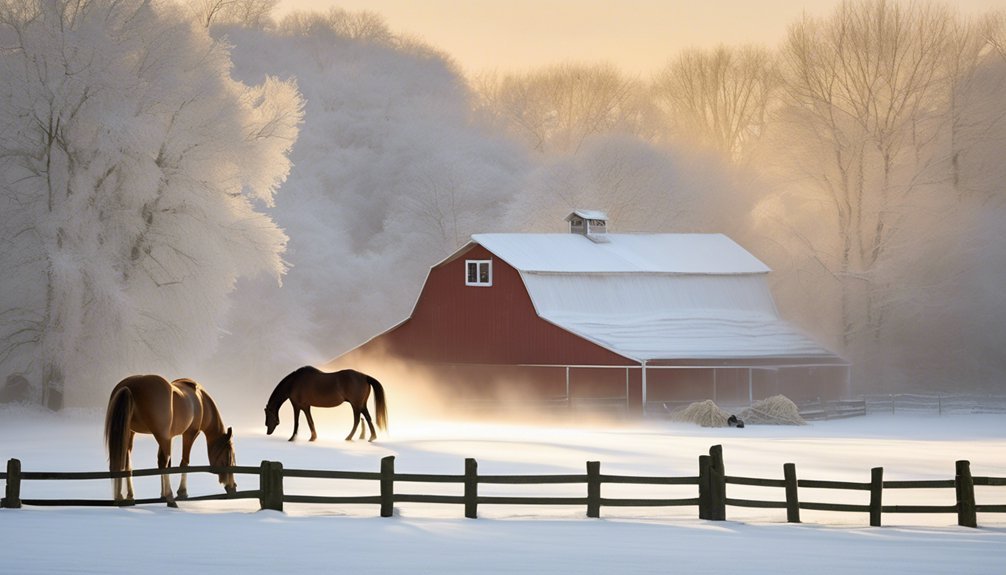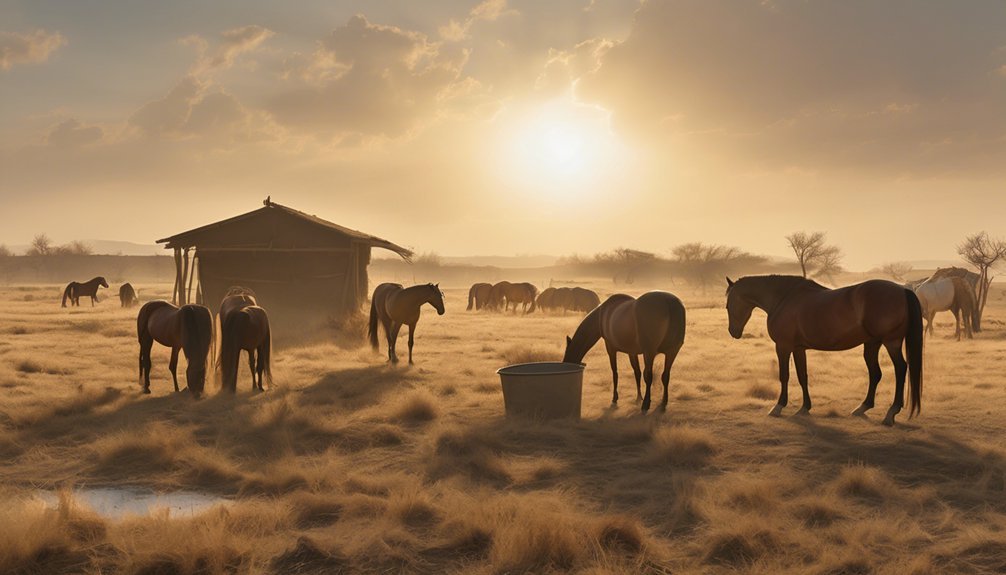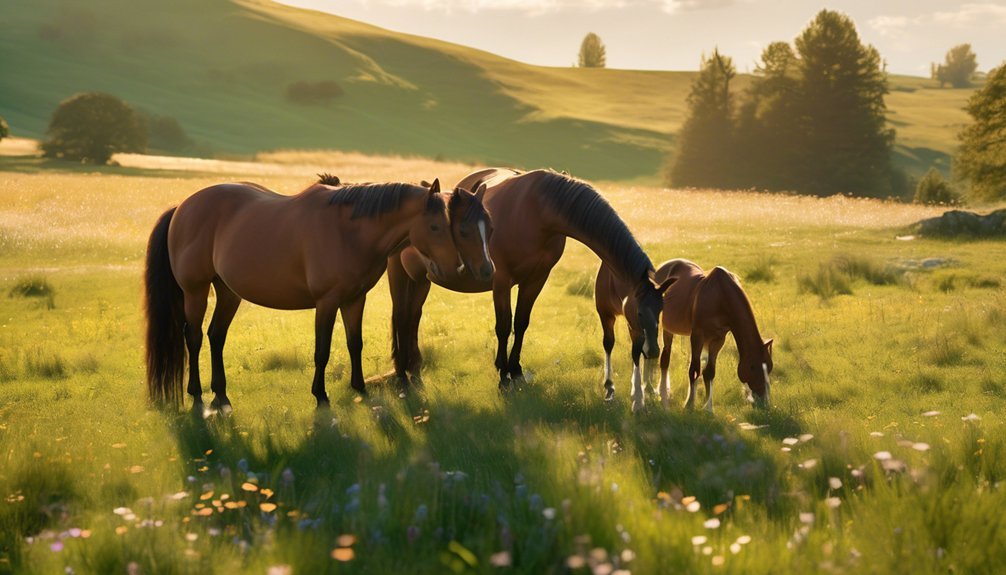
It's interesting how many horse owners overlook the impact of winter on their horses' diets. As temperatures drop, your horse's nutritional needs shift significantly, requiring a more strategic approach to feeding. Understanding the balance between forage and concentrates is crucial, especially for older equines. But what specific adjustments should you make to ensure your horse thrives during these colder months? Let's explore the essential components of a winter feeding plan.
Key Takeaways
- Increase caloric intake as cold weather raises energy expenditure; monitor body condition regularly to adjust diets accordingly.
- Ensure high-quality forage and hay are available, as they are essential for digestion and energy.
- Gradually adjust grain and concentrate rations based on workload, maintaining a solid forage base.
- Provide consistent access to fresh water, ensuring temperatures encourage drinking, especially in freezing conditions.
- Pay special attention to older horses, offering easily digestible feeds and monitoring their body condition closely.
Understanding Your Horse's Nutritional Needs in Winter

When winter arrives, understanding your horse's nutritional needs becomes crucial to maintaining its health and well-being.
During this season, your horse experiences metabolic changes that affect its nutrient requirements. Cold weather increases energy expenditure, so your horse may need more calories to stay warm and active.
Ensure you're providing adequate protein, vitamins, and minerals, as these elements support immune function and overall vitality.
Pay attention to your horse's body condition; it can guide you in adjusting their diet. Regularly monitor their weight and adjust feed accordingly.
Remember, a well-nourished horse is more resilient to winter's challenges, allowing it to thrive during these colder months.
Prioritizing nutrition will forge a stronger bond between you and your equine companion.
The Importance of Forage and Hay
Forage and hay play a vital role in your horse's winter diet, serving as the primary source of fiber necessary for digestive health.
Ensuring high forage quality is essential; it affects not only digestion but also overall energy levels and mood during the colder months. Look for hay that's green, leafy, and free from mold or dust.
Proper hay storage is equally important—keep it dry and off the ground to prevent spoilage. A well-maintained supply of quality forage helps keep your horse warm, as digestion generates heat.
During winter, don't underestimate the impact of good forage on your horse's well-being. Prioritize these elements to keep your equine companion healthy and comfortable throughout the season.
Adjusting Grain and Concentrate Rations

While maintaining a solid forage base is crucial, adjusting grain and concentrate rations can further optimize your horse's nutrition during winter.
Different grain types, such as oats, barley, and corn, offer varying energy levels. You'll want to assess your horse's workload and body condition to determine the appropriate grain type and quantity.
Concentrate ratios also play a vital role; adjusting these can help ensure your horse receives balanced vitamins and minerals.
During colder months, consider increasing the grain and concentrate intake gradually to support their energy needs.
Monitor your horse's body condition closely, as changes in weight may require further adjustments.
Tailoring these rations will help maintain your horse's health and vitality throughout the winter season.
Hydration: Ensuring Access to Fresh Water
Ensuring your horse has consistent access to fresh water is essential, especially during winter months when hydration needs can be overlooked. Cold weather can deter your horse from drinking enough, so it's crucial to monitor both water temperature and hydration frequency. Horses typically prefer water that's at least 45°F to encourage drinking.
Here's a quick reference table to help you:
| Water Temperature (°F) | Recommended Hydration Frequency |
|---|---|
| Below 32 | Check every 1-2 hours |
| 32-45 | Check every 3-4 hours |
| 45-60 | Check every 4-6 hours |
| Above 60 | Check every 6-8 hours |
Supplements for Winter Wellness

Maintaining your horse's health during winter goes beyond just hydration; it also involves considering dietary supplements that can support their overall wellness.
Vitamin supplementation plays a crucial role in keeping your horse's immune system strong and promoting optimal energy levels during colder months. Essential vitamins like A, D, and E can help combat the challenges of winter.
Additionally, focusing on mineral balance is vital. Minerals like calcium, phosphorus, and magnesium aid in muscle function and bone health, which can be particularly stressed in winter conditions.
It's important to assess your horse's specific needs and consult with a veterinarian to tailor a supplementation plan that ensures their well-being throughout the season.
Your horse deserves the best care to thrive during winter.
Monitoring Body Condition and Weight
To effectively support your horse's health during winter, regularly monitoring their body condition and weight is essential.
Start by assessing their body score using a standardized scale, typically ranging from 1 to 9. This evaluation helps you identify any weight loss or gain that could affect their overall well-being.
Weight tracking is crucial, especially during colder months when energy demands increase. Use a scale or weigh tape to measure their weight consistently, noting any significant changes.
Adjust their feeding regimen based on these observations, ensuring they receive adequate nutrition to maintain a healthy body condition.
Special Considerations for Older Horses and Ponies

While winter can be challenging for all horses, older horses and ponies often require special attention due to their unique nutritional needs and health considerations.
Senior nutrition is vital; you should focus on providing easily digestible feeds that meet their energy requirements. High-quality forage, soaked hay, or senior grains can support their aging digestive systems.
Don't overlook dental health; older horses may struggle with chewing, so regular dental check-ups are essential. You might need to adjust feed textures or provide supplements to ensure they get necessary nutrients without discomfort.
Monitoring their body condition closely is crucial, as older horses can lose weight more rapidly in harsh conditions. Your proactive care can significantly enhance their well-being during the colder months.
Frequently Asked Questions
Can Horses Eat Snow for Hydration in Winter?
While horses can eat snow for hydration, relying solely on snow consumption isn't ideal. It's essential to provide alternative hydration methods, ensuring your horse stays adequately hydrated during winter months for optimal health and performance.
How Do I Recognize Signs of Cold Stress in Horses?
When the chill wraps around your horse like a heavy blanket, watch for signs of cold stress. Look for behavioral changes such as shivering, increased isolation, or reluctance to move—each a call for your attention.
Is It Safe to Change My Horse's Diet Suddenly in Winter?
Changing your horse's diet suddenly in winter isn't safe. A gradual diet transition is essential for proper winter nutrition, helping your horse adjust without digestive upset. Always prioritize a slow change for their overall health and well-being.
What Are the Best Types of Hay for Winter Feeding?
Isn't it crucial to choose the right hay? For winter feeding, prioritize high-quality hay, like alfalfa or grass mixes. Timing considerations are essential; ensure you're providing the best nutrition when your horse needs it most.
How Often Should I Check My Horse's Water Supply in Winter?
You should check your horse's water supply at least twice daily during winter. Monitor water temperature closely; cold water can deter drinking. Ensuring proper hydration meets your horse's needs and supports overall health in colder months.
Conclusion
In winter, your horse's nutritional needs skyrocket, making it crucial to provide the right forage, grain, and hydration. Regularly monitor their body condition to ensure they're thriving, not just surviving. Remember, a well-fed horse can face the chill like a champion, ready to conquer the cold! Don't underestimate the importance of tailored care for older horses, as their needs can be as unique as snowflakes. With the right approach, your horse will stay healthy and happy all season long.





